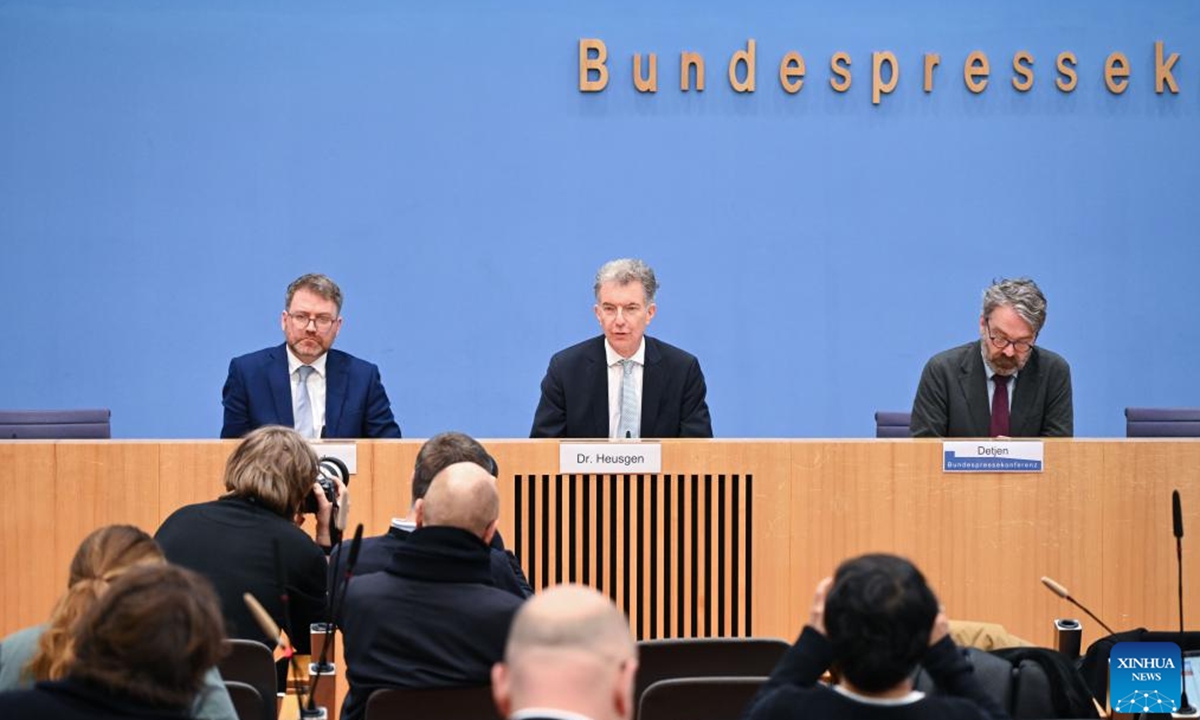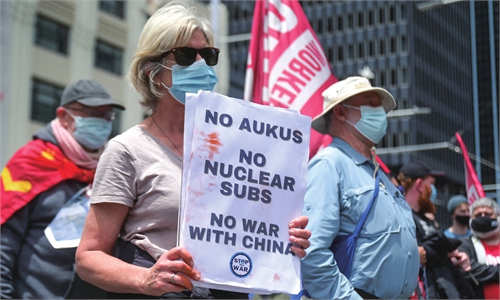US and Western collective efforts to re-center are the source of tensions all over the world: Australian scholar

Christoph Heusgen (C), chairman of the Munich Security Conference, attends the release of Munich Security Report 2024 in Berlin, Germany, Feb. 12, 2024. The Munich Security Report 2024 published ahead of this year's Munich Security Conference expressed worries over the "lose-lose dynamics" amid growing geopolitical tensions and rising economic uncertainty. (Xinhua/Ren Pengfei)
Editor's Note:
Pessimistic "Munich Security Report 2024" displays an "anxiety from the traditional Western colonial powers - The world is changing around them, and they are no longer in total control over these changes," said Warwick Powell (Powell), chairman at Smart Trade Networks, adjunct professor at the Queensland University of Technology and former policy advisor to Kevin Rudd. The Munich Security Conference, one of the world's most renowned forums for debating the most pressing challenges to international security, will take place from February 16 to 18. What is the biggest problem of "security" today? What can we expect from the upcoming conference? Powell shared his views with Global Times (GT) reporter Li Aixin.
GT: What do you think of the "Munich Security Report 2024 - Lose-Lose?" What signal does it send?
Powell:
The report provides a snapshot of a predominantly transatlantic/collective West perspective on the state of the world today, and prospects for the foreseeable future. Its overall tone is pessimistic, although its touchstone for this assessment is a rather rose-tinted view of the unipolar period between1991 and 2019. In this period, when American Primacy was prevalent, the collective West largely viewed the world in benign terms. American Primacy or the unipolar moment is now behind us. So, in this sense, the report reflects a diminution of collective Western power.
That being said, it speaks of lose-lose and zero-sum dynamics, but I would argue that the present state of international relations is not simply a lose-lose situation. There are many areas of coordination and collaboration; it's just that the collective West - led by the US - is no longer the dominant player or the driving force. So, collaborative institutions and contours of transnational coordination and collaboration are evolving. We have, of course, the expansion of BRICS. By 2028, the BRICS+ economies will contribute about 40 percent to global GDP compared to the G7's 28 percent (in nominal terms and in Purchasing Parity Terms, the gap is even greater). The Shanghai Cooperation Organisation continues to work on multilateral security alignments in the Eurasian continent. We see new collaborative institutions emerge in the West Africa/Sahel region, as an apparent rejection of colonial institutions. The report views the dynamics in the Sahel negatively, as expected, but from the perspective of the impacted nations, I doubt that they are hankering for the reestablishment of the colonial order.
The report displays an anxiety from the traditional Western colonial powers. The world is changing around them, and they are no longer in total control over these changes.
GT: What do you think is the biggest problem of "security" today?
Powell:
The greater risk to security today is the emergence of an intensified millenarian zealotry anchored by racialized (American) exceptionalism, mainly in the American political establishment. This millenarian disposition, coupled with a simplistic frame of "good versus evil," is the basis of American Primacy. While this disposition is most pronounced in the US political establishment, it also resonates among the network of US allies and sub-imperial states.
As such, subordinate or sub-imperial states have a tendency to cling to what is seen to be the security guarantees offered by allegiance to the US. Trump's recent remarks concerning NATO have, of course, disrupted this comfort. The apoplectic reactions have been telling. The reactions have been intense across the Atlantic, but are also evident in the Pacific, such as Australia, where some in what I call the "insecurity apparatuses" are fervently trying to convince America to not "abandon Australia." The argument goes: Australia has a lot to offer American security, so don't abandon us.
Associated with this millenarian zealotry is a trigger-happy tendency that privileges "kinetic diplomacy" first. America is addicted to military intervention, according to US scholars Monica Toft and Sidita Kushi in their book Dying by the Sword. Harvard professor Stephen Walt in a recent piece in Foreign Policy magazine wonders why America insists on pursuing aggressive and militaristic policies when they consistently don't work.
A multipolar world requires mutual understanding and effort to design mutually acceptable solutions. This process is difficult and time-consuming, and it necessitates a willingness to compromise in order to reach common ground. This is not the way of American Primacy. American Primacy is characterized by the habits of seeking to impose "take it or leave it" propositions, which over time have generated growing hostility toward the US, undermined trust and ultimately diminished the capacity of the collective West to assume a genuine leadership role.
GT: What do you expect from the upcoming Munich Security Conference? Will it offer any rational solution to the problems raised above?
Powell:
It is unlikely to offer solutions because solutions require a change in outlook. It requires an acceptance that multipolarity is here to stay, and that efforts to preserve or reclaim primacy are anathema to securing peace and security going forward. More likely, it will lead to a "doubling down" on existing approaches. Underpinning all of this is a deep sense of "displacement anxiety." The structures of the global system are changing in such a way as to decenter the US and the collective West more generally. Right now, US and collective West efforts to re-center are the source of tensions all over the world.
By not inviting "adversaries" to the conference, how does the Conference expect to even contemplate the design of a meaningful comprehensive security architecture in which the interests of all are taken into account? That it cannot do this immediately limits the Conference to a largely transatlantic confab.
GT: In terms of Indo-Pacific, the report said, "In the Indo-Pacific, China is ever more vehemently advancing its China-centric vision for regional order, leading to pushback from the US and countries in the region, thus fueling zero-sum dynamics. While Washington has embraced the concept of a 'Free and Open Indo-Pacific,' which is based on an understanding of regional order that is not centred on China, but on the rule of law and the ability of all countries in the region to pursue their own interests freely and without intimidation." What's your take on this view?
Powell:
China has a great interest in maintaining security of commercial traffic through the seaways of Asia and the Pacific. After all, it is the world's largest trading nation. Much of China's energy imports come through the Straits of Malacca. Ensuring that this flow isn't disrupted is in China's national security and economic interests.
China sees ongoing US dominance in Asia as a risk to security and prosperity. The US has demonstrated that it is an active agent provocateur, as the case of eastern Europe shows. The US reaches for the gun whenever it feels "justified." Just look at the situation in Gaza. The US continues to send weapons while tens of thousands of civilians, including children, are being slaughtered.
Back to Asia. For decades, the US has harbored a desire to "bring China into the American fold." US National Security Advisory Jake Sullivan recently acknowledged that the US sought to "shape or change" China for many decades, to no avail. If America couldn't "shape or change" China, then China is now seen as "No.1 enemy."
The Pacific as a whole was, after WWII, framed as "America's Lake." American dominion over the vast oceans was rationalized as necessary to provide forward defenses for the homeland, and combined with Taiwan island, would act as a bulwark. As the years went by, US military presence in Asia grew. There are now countless bases and tens of thousands of American service personnel based in Australia, Japan, South Korea, Philippines and even Taiwan island. American military hardware maintains an active presence in the region.
These are the historical conditions that are not talked about much. They have been normalized. So, the situation in Asia isn't the fairy tale of "rule of law"; like much else in the post-1990 world, it's been a place in which America's rules were the final arbiter.
What's emerging is regional multipolarity. US Primacy in Asia is also over. Sure, America is being de-centered in this process but it's not being replaced by another hegemon. In part, that's because while America can be and has been de-centered, it cannot for the foreseeable future be entirely displaced. Its military tentacles are too well established across the region for that to happen.
The challenge in the region is how to build the institutions necessary to design and create a sustainable peace, enabling security and prosperity to develop. Security and prosperity are symbiotic. American Primacy in Asia is antithetical to regional peace, security and development.
GT: How do you see the prospect of Asia overcoming the challenge?
Powell:
Change is inevitable. But it will have some very bumpy moments. The US will try to disrupt this change, and it will try to do that by provoking China. This is what it did for decades in Ukraine. Patience and a focus on resolving regional differences (especially the Code of Conduct in the SCS) will be quite important.
There's other dynamics too - the United Nations is at times a disappointing institution but at times, despite all of this, it can create the right conditions. What's happening at that level in relation to Gaza is a case in point. It is slow but slowly but surely the US is being marginalized and put into a position where it will either be further isolated or be forced to the table with others to secure a meaningful peace in Palestine.
GT: What impact do you think the US election will bring to the world's security landscape?
Powell:
In some ways, yes; in some ways, no.
There's a lot of focus on the differences between Biden and Trump. Trump's recent remarks about NATO are emblematic of the differences, at least superficially, though there're plenty of debates as to whether Trump is really just softening up Europe to "pay up." Trump, from time to time, echoes a slightly more "Jacksonian" foreign policy disposition that emphasizes "America first" compared to Biden, who is from a classic "Wilsonian" interventionist tradition. Will Trump genuinely become less interventionist? Who knows.
I also say no, because the influence of the neocons within the American political establishment, particularly in relation to China - is powerful. There is a strong anti-China consensus on Capitol Hill, reflecting the "displacement anxiety" I mentioned.

